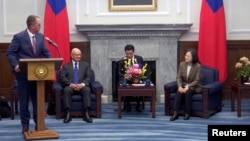A leading Australian opposition lawmaker visiting Taiwan this week has highlighted the importance of security cooperation between Taiwan and Australia.
In a meeting with Taiwanese President Tsai Ing-wen Monday, Andrew Wallace, the deputy chair of Australia's Parliamentary Joint Committee on Intelligence and Security, said that in an ever-changing geopolitical landscape, security cooperation is "paramount."
"Taiwan and Australia both recognize the importance of maintaining peace and stability in the Indo-Pacific region. Our partnership, our strategic partnership, contributes significantly to regional security," he said.
Wallace is one of a group of five lawmakers who arrived in Taiwan Sunday for a six-day visit. During their meeting with President Tsai, Wallace added that both Taiwan and Australia have a vested interest in a rules-based, open and inclusive Indo-Pacific.
"In defense cooperation, our defense forces engage in joint exercises, intelligence sharing and capacity building programs,” Wallace said.
Taiwan and Australia are collaborating on cyber security initiatives safeguarding critical infrastructure and important digital networks, he said, without giving details.
Tsai told Wallace and other visiting Australian lawmakers that Taiwan and Australia are staunch defenders of freedom and democracy.
"Faced with authoritarian expansionism, democracies today must stand together and bolster cooperation," she said.
Like many countries, Australia does not have formal diplomatic ties with Taiwan, but it has grown concerned about China’s increased military activity and pressure on the democratic island.
China considers self-governing Taiwan a wayward province and has not ruled out the use of force to unify it with the mainland.
Wallace’s remarks come as Australia, the United States, Japan and the Philippines conduct naval exercises in the South China Sea. It also comes as U.S. officials have signaled that there is growing interest in the region for more participation in the regional security partnership among Australia, the United Kingdom and the U.S., known as AUKUS.
On Monday, the three countries issued a joint statement that they are considering working with Japan through AUKUS.
Clive Hamilton, professor of public ethics at Charles Sturt University in Canberra, told VOA that while the visit of Australian MPs to Taiwan is not of an official nature, it can be seen as a sign of solidarity with Taiwan and its right to exist as a democratic and independent entity, and a means to further strengthen ties, including military and intelligence cooperation.
"The MPs, and the government, are fully aware that Beijing will strongly object to the visit so the decision to proceed sends a message that they will not be bullied out of making the trip,” Hamilton said. “There is great concern in Australia about China's de facto colonization of the South China Sea and its aggressive and illegal actions against the Philippines."
Liberal MP Angie Bell, who is part of the delegation, told VOA Mandarin that many Australians believe cooperation between Australia and Taiwan can help enhance regional security and stability.
"We are willing to discuss issues such as maritime security, intelligence sharing, and joint military exercises to strengthen our two countries' cooperation capabilities on regional security challenges,” Bell said. “We recognize the security challenges that exist in the South China Sea and other regions, and we are willing to cooperate with Taiwan and other regional partners to jointly address these challenges and maintain regional peace and stability.”
It is not clear how China may respond to the Australian lawmakers’ visit to Taiwan or their remarks about security cooperation. Beijing adamantly opposes any interaction between Taiwan and other foreign governments or politicians.
Last month, China’s foreign minister, Wang Yi, visited Australia for the first time in seven years. Following the visit, China’s foreign ministry suggested that it is actively considering “launching a dialogue on maritime affairs” with Australia.
VOA’s Mandarin Service contributed to this report, along with Erin Hale. Some information came from Reuters.





